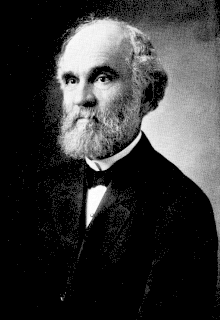Winslow Upton
Winslow Upton (October 12, 1853 – January 8, 1914) was an American astronomer.[1] He published extensively on the subject of meteorology.[2]
Winslow Upton | |
|---|---|
 | |
| Born | October 12, 1853 |
| Died | January 8, 1914 (aged 60) |
| Alma mater | Brown University, University of Cincinnati |
| Spouse(s) | Cornelia Augusta Babcock |
| Scientific career | |
| Fields | Astronomy, Meteorology |
| Institutions | Ladd Observatory |
| Doctoral students | Frederick Slocum |
Biography
He received his undergraduate degree from Brown University and was valedictorian when he graduated in 1875.[1] Upton then worked as an assistant at Mitchel Observatory of the University of Cincinnati where he received his master's degree in 1877.[1] He later received an honorary doctorate from Brown in 1906.[3]
He became an assistant astronomer at the Harvard Observatory in 1877. During this time he wrote a parody of Gilbert and Sullivan's comic opera H.M.S. Pinafore titled Observatory Pinafore.[4] Then he became an assistant engineer for the U. S. Lake Survey from 1879. In 1880 he was a computer at the U.S. Naval Observatory. He was a computer and assistant professor at the U.S. Signal Service in 1881.[5][6] He was appointed professor and head of the department of astronomy at Brown in 1884.[3] He then became director of Ladd Observatory when it opened in 1891.[7] During his tenure Upton also served as secretary of the faculty and dean at Brown.[2]
He was a member of the U. S. government eclipse expeditions of 1878 and 1883, also of two private expeditions sent out in 1887 and 1889, and in 1896-97 was attached to the southern station of Harvard University at Arequipa, Peru.[8] His systematic research studying meteorology during solar eclipses has been described as "pioneering."[9]
He married Cornelia Augusta Babcock in 1882 and they had two children. Eleanor Stuart Upton was a librarian at the John Carter Brown Library and Yale University Library. Margaret Frances Upton taught bacteriology. She was also a lab technician and research assistant at hospitals.[10]
Published works
Upton wrote a monthly astronomy column for the Providence Journal for twenty years.[3]
- Upton, Winslow (1881). Information Relative to the Construction and Maintenance of Time Balls. Professional Papers of the Signal Service. 5. Washington, DC: US Government Printing Office. Retrieved 14 January 2020.
- Upton, Winslow (1883). "Lectures on Practical Astronomy". In Hazen, W. B. (ed.). Annual Report of the Chief Signal Officer, United States Army, to the Secretary of War. 1. Washington, DC: US Government Printing Office. pp. 102–120. Retrieved 14 January 2020.
- Upton, Winslow (1885). "The Use of the Spectroscope in Meteorological Observations". Memorie della Societa Degli Spettroscopisti Italiani. 13: 113. Bibcode:1885MmSSI..13..113U.
- Upton, Winslow (1887). An Investigation of Cyclonic Phenomena in New England. Ann Arbor, MI: Register Publishing House. Retrieved 14 January 2020.
- Upton, Winslow; Rotch, Abbott Lawrence; Pickering, Edward Charles (1893). "Meteorological and other observations made at Willows, California, in connection with the total solar eclipse of January 1, 1889". Annals of Harvard College Observatory. 29 (1): 1. Bibcode:1893AnHar..29....1U.
- Upton, Winslow (1896). Star atlas, containing stars visible to the naked eye. Boston: Ginn & Co. LCCN 05008125. Retrieved 14 January 2020.
References
- Slocum, Frederick (1914). "Winslow Upton". Popular Astronomy. 22: 208–211. Bibcode:1914PA.....22..208S.
- Archibald, R. C. (1914). "Winslow Upton". Science. 39 (997): 202–204. Bibcode:1914Sci....39..202A. doi:10.1126/science.39.997.202. PMID 17747743.
- "Professor Upton, Astronomer, Dead". Providence Daily Journal. January 9, 1914.
- Grier, David Alan (2013). "A Carpet for the Computing Room". When Computers Were Human. Princeton University Press. pp. 84–87. ISBN 9781400849369.
- Upton, William Henry (1893). "American Uptons". Upton Family Records: Being Genealogical Collections for an Upton Family History. London: Mitchell and Hughs. pp. 315–316. LCCN 09015478.
- Mitchell, Martha (1993). "Upton, Winslow". Encyclopedia Brunoniana. Providence, RI: Brown University Library. Retrieved March 23, 2019.
- Mitchell, Martha (1993). "Ladd Observatory". Encyclopedia Brunoniana. Providence, RI: Brown University Library. Retrieved March 23, 2019.
- This article incorporates text from a publication now in the public domain: Wilson, J. G.; Fiske, J., eds. (1900). . Appletons' Cyclopædia of American Biography. New York: D. Appleton.
- Aplin, K. L.; Scott, C. J.; Gray, S. L. (2016). "Atmospheric changes from solar eclipses". Philosophical Transactions of the Royal Society A: Mathematical, Physical and Engineering Sciences. 374 (2077): 20150217. arXiv:1603.02987. Bibcode:2016RSPTA.37450217A. doi:10.1098/rsta.2015.0217. PMID 27550760.
- Upton family papers. Northampton, MA: Sophia Smith Collection of Women's History, Smith College Libraries.
Further reading
- Upton, Eleanor S.; Upton, Margaret F. (1971). An Earth-Bound Astronomer: Winslow Upton. Northhamton, MA: Metcalf Printing. ASIN B00070N68Q.